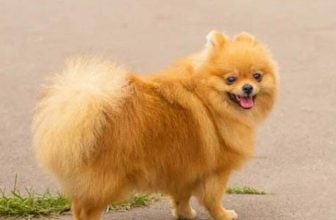
Owners can tell whether a Pomeranian is a small-bodied Pomeranian based on their body shape, because a small-bodied Pomeranian will be smaller than a normal Pomeranian. First of all, Pomeranian’s body size is very small. Even when he is an adult, his height will not exceed 22 centimeters.
Secondly, it is difficult to distinguish between small Pomeranian and normal Pomeranian in childhood, but the owner can look at whether its parents have Small Pomeranian or the birth certificate to determine whether it is Small Pomeranian or normal Pomeranian.
Under normal circumstances, Pomeranian dogs after 12 months of age are basically stereotyped, but it is also related to feeding and other factors. If you overfeed for a long time, it will easily lead to a large size of Pomeranian. This is because the amount of exercise of Pomeranian itself is relatively small. Pomeranians are small indoor dogs and do not require high amounts of exercise, so they need to be fed scientifically. It is recommended to feed high-quality food and avoid feeding high-fat, high-protein and other foods.
Generally, when feeding small Pomeranians, we pet owners need to adopt the principle of eating less and more meals. For example, small Pomeranians aged 2 or 3 months should be fed about 3 or 4 times a day, and each feeding should be finished within 30 minutes.
How to train a small Pomeranian to use the toilet
Small dog breeds such as Pomeranians require regular toilet training. Here are some training suggestions: Establish a fixed feeding and defecation schedule: Try to feed the dog at the same time every day and take it to a designated place for defecation. Take it out in the morning, after lunch and dinner, and before bed.
Observe your dog’s body language: When your Pomeranian wants to poop, he will display anxious behaviors such as sniffing, pacing, or walking around you. Learn to read its body language and you’ll be able to detect its needs more quickly. Reward correct behavior: When Pomeranian defecates in the correct place, reward him or her in time, such as verbal praise, food or toys, etc.
This will make it easier for the dog to remember the correct behavior and make it more likely to repeat the behavior. Don’t punish wrong behavior: If your Pomeranian urinates indoors, don’t use punishment to solve the problem, as this will create fear and anxiety in the dog, which will affect the effectiveness of its training. Instead, you should ignore misbehavior and take your dog to a designated place to defecate promptly. Consistent training: Potty training requires consistent patience and discipline, especially when your dog is young. With regular training, your Pomeranian will gradually learn correct behaviors and eventually form good habits. In short, potty training requires patience, persistence and the right approach. If you encounter difficulties, consider seeking help from a professional trainer.







